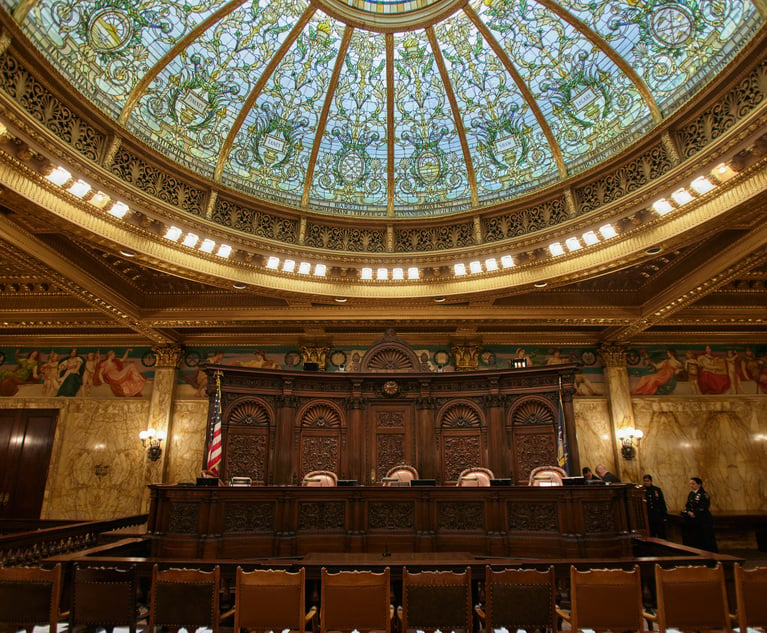Lessons From Buzz Aldrin Guardianship: Twin Filings Put Focus on Abuse
In his Elder Law column, Daniel G. Fish writes: Buzz Aldrin was the second person to set foot on the moon's surface and only 12 people have set foot there. But now he is one of an estimated one and a half million adults who are the subject of guardianship proceedings in the United States.
August 16, 2018 at 11:51 AM
6 minute read
 Buzz Aldrin on the Moon
Buzz Aldrin on the Moon
Buzz Aldrin was the second person to set foot on the moon's surface and only 12 people have set foot there. But now he is one of an estimated one and a half million adults who are the subject of guardianship proceedings in the United States. The guardianship case was filed in Brevard County, Florida, on May 30, by two of Aldrin's three children and by his business manager. Aldrin has vigorously opposed the proceeding and in response filed a separate action charging them with breach of fiduciary duty; exploitation of the elderly; constructive fraud; unjust enrichment; undue influence, conversion and conspiracy.
It is not possible at this time to assess the strength of the allegations of the guardianship or the verified complaint filed in response. The guardianship file is sealed and the responsive suit is a public record so only one side of the case is revealed. In addition, these cases have only been recently filed and it is too early to predict the outcome of either one. It is appropriate at this time however, to call attention to Aldrin's response to the guardianship, suggesting that the best defense may be an offense.
The Florida Guardianship
Aldrin, age 88, has named his children to important position in the several interests he has created (Buzz Aldrin Enterprises, Inc; Buzz Aldrin Space Foundation, Inc.; Sharespace Foundation, Inc., Aldrin Space Institute and Aldrin Center for Entrepreneurship in Space) indicating a close familial relationship at one time. He has also named one of his sons as trustee of a revocable trust and agent under a power of attorney. But, similar to the fate of Shakespeare's King Lear, it does not appear that the loving relationship has continued, resulting in the filing of a guardianship petition. It has been reported that within the guardianship petition is an allegation that Aldrin is “in cognitive decline.” There may also have been specific allegations that he suffers from dementia and Alzheimer's disease.
Florida statutes require that within five days after a petition for determination of incapacity has been filed the court must appoint a three-member “examining committee.” One member of the committee must be a psychiatrist or other physician. The other two members of the committee must be either a psychologist, or gerontologist, or another psychiatrist or physician, or registered nurse, or nurse practitioner, or licensed social worker, or person with an advanced degree in gerontology from an accredited institution of higher learning or a person appointed at the discretion of the court. A comprehensive examination must be made of the alleged incapacitated person and it must include a physical examination, a mental health examination and a functional assessment. Each committee member must submit a written report.
Buzz Aldrin's Response
The unusual aspect of this case is the response of Aldrin to the guardianship filing. Most subjects of a guardianship who disagree about the need for the court intervention present their defense in the original proceeding. In this case, Aldrin filed a separate action on June 7, against his children (and his business manager and several organizations with which he is associated). Aldrin's verified complain paints a picture of a celebrity with the capacity to manage his own affairs who is being manipulated by his children and business manager for their own selfish ends. The specific language of the complaint alleges that the defendants:
“… have assumed control and access to the plaintiff's personal credit cards, bank accounts, trust money, space memorabilia, space artifacts, social media accounts and all elements of the Buzz Aldrin brand.”
“… have been for the past number of years been slandering the plaintiff in public and/or to other individuals or small groups by stating the plaintiff has dementia and Alzheimer's. The defendants have used this tactic to gain further control over the plaintiff's personal relationships, business contacts and assets.”
“… have effectively established a de facto guardianship over the plaintiff.”
“… have forbidden the plaintiff to marry and specifically and deliberately have undermined bullied and defamed all of the plaintiff's personal romantic relationships.”
He also charges defendants with exploitation of the elderly. “Plaintiff is a vulnerable adult, as defined by Florida Statutes and pursuant to Florida Statute Section 415.111, due to the plaintiff's advanced age of 88 years. Defendant Andrew Aldrin, individually exploited the plaintiff by knowingly and through deception or intimidation deprived the plaintiff of his finances, property and knowledge of the plaintiff's business affairs.”
Response of Defendants to Suit by Buzz Aldrin
It is noteworthy that in the case initiated by Aldrin, there is a motion by the defendants asking that the court take judicial notice of the reports from Dr. Margaret Rank, Carmal Morelli, RN and Marti Jo McCoy, LCSW. They are each identified as member of the “examining committee” in the separate guardianship case. The examining committee reports are described as confidential and therefore not attached to the motion. The fact that the defendants sought to have the court made aware of the examining committee reports is an indication that the defendants believe the reports contain matters that are favorable to their position and unfavorable to Aldrin. In addition, the defendants have filed a motion for a stay of the proceeding initiated by Aldrin pending the outcome of a ”… previously filed action to determine the capacity of the plaintiff.”
Conclusion
Aldrin joins a list of many well-known individuals who have been the subject of guardianship proceedings (Brooke Astor; Sumner Redstone; Glen Campbell; Mickey Rooney; Casey Kasem and Zsa Zsa Gabor). The proceeding was brought despite the fact that Aldrin had executed a power of attorney and revocable trust agreement, documents often thought to obviate the need for a guardianship. In the Aldrin case, as in many of the other high-profile guardianships, the proceeding is evidence of fractured family relationships.
The cases also demonstrate that no one is immune from the possibility of being the subject of a guardianship. Status alone or financial wealth alone or the use of inter-vivos estate planning documents alone is not enough to ensure that an older individual is insulated from a guardianship proceeding.
The twin filings in this case are a part of the current debate over whether the guardianship statutes are protecting the elderly from abuse or subjecting them to abuse. Once a rather unusual proceeding, the guardianship is now commonly a part of the trust and estates practice.
Daniel G. Fish is a partner at McLaughlin & Stern.
This content has been archived. It is available through our partners, LexisNexis® and Bloomberg Law.
To view this content, please continue to their sites.
Not a Lexis Subscriber?
Subscribe Now
Not a Bloomberg Law Subscriber?
Subscribe Now
NOT FOR REPRINT
© 2025 ALM Global, LLC, All Rights Reserved. Request academic re-use from www.copyright.com. All other uses, submit a request to [email protected]. For more information visit Asset & Logo Licensing.
You Might Like
View All
Decision of the Day: Trial Court's Sidestep of 'Batson' Deprived Defendant of Challenge to Jury Discrimination

Decision of the Day: Commercial Division Finds Defendant Engaged in Unfair Competition Against Plaintiff

Decision of the Day: Court Rules on Judgment Motions Over Police Killing of Pet Dog While Executing Warrant

Decision of the Day: JFK to Paris Stowaway's Bail Revocation Explained
Trending Stories
- 1Uber Files RICO Suit Against Plaintiff-Side Firms Alleging Fraudulent Injury Claims
- 2The Law Firm Disrupted: Scrutinizing the Elephant More Than the Mouse
- 3Inherent Diminished Value Damages Unavailable to 3rd-Party Claimants, Court Says
- 4Pa. Defense Firm Sued by Client Over Ex-Eagles Player's $43.5M Med Mal Win
- 5Losses Mount at Morris Manning, but Departing Ex-Chair Stays Bullish About His Old Firm's Future
Who Got The Work
J. Brugh Lower of Gibbons has entered an appearance for industrial equipment supplier Devco Corporation in a pending trademark infringement lawsuit. The suit, accusing the defendant of selling knock-off Graco products, was filed Dec. 18 in New Jersey District Court by Rivkin Radler on behalf of Graco Inc. and Graco Minnesota. The case, assigned to U.S. District Judge Zahid N. Quraishi, is 3:24-cv-11294, Graco Inc. et al v. Devco Corporation.
Who Got The Work
Rebecca Maller-Stein and Kent A. Yalowitz of Arnold & Porter Kaye Scholer have entered their appearances for Hanaco Venture Capital and its executives, Lior Prosor and David Frankel, in a pending securities lawsuit. The action, filed on Dec. 24 in New York Southern District Court by Zell, Aron & Co. on behalf of Goldeneye Advisors, accuses the defendants of negligently and fraudulently managing the plaintiff's $1 million investment. The case, assigned to U.S. District Judge Vernon S. Broderick, is 1:24-cv-09918, Goldeneye Advisors, LLC v. Hanaco Venture Capital, Ltd. et al.
Who Got The Work
Attorneys from A&O Shearman has stepped in as defense counsel for Toronto-Dominion Bank and other defendants in a pending securities class action. The suit, filed Dec. 11 in New York Southern District Court by Bleichmar Fonti & Auld, accuses the defendants of concealing the bank's 'pervasive' deficiencies in regards to its compliance with the Bank Secrecy Act and the quality of its anti-money laundering controls. The case, assigned to U.S. District Judge Arun Subramanian, is 1:24-cv-09445, Gonzalez v. The Toronto-Dominion Bank et al.
Who Got The Work
Crown Castle International, a Pennsylvania company providing shared communications infrastructure, has turned to Luke D. Wolf of Gordon Rees Scully Mansukhani to fend off a pending breach-of-contract lawsuit. The court action, filed Nov. 25 in Michigan Eastern District Court by Hooper Hathaway PC on behalf of The Town Residences LLC, accuses Crown Castle of failing to transfer approximately $30,000 in utility payments from T-Mobile in breach of a roof-top lease and assignment agreement. The case, assigned to U.S. District Judge Susan K. Declercq, is 2:24-cv-13131, The Town Residences LLC v. T-Mobile US, Inc. et al.
Who Got The Work
Wilfred P. Coronato and Daniel M. Schwartz of McCarter & English have stepped in as defense counsel to Electrolux Home Products Inc. in a pending product liability lawsuit. The court action, filed Nov. 26 in New York Eastern District Court by Poulos Lopiccolo PC and Nagel Rice LLP on behalf of David Stern, alleges that the defendant's refrigerators’ drawers and shelving repeatedly break and fall apart within months after purchase. The case, assigned to U.S. District Judge Joan M. Azrack, is 2:24-cv-08204, Stern v. Electrolux Home Products, Inc.
Featured Firms
Law Offices of Gary Martin Hays & Associates, P.C.
(470) 294-1674
Law Offices of Mark E. Salomone
(857) 444-6468
Smith & Hassler
(713) 739-1250






